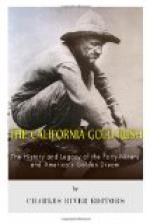Trials went briskly forward in due order, with counsel for defense and ample opportunity to call witnesses. There were no more capital punishments. It was made known that the Committee had set for itself a rule that capital punishment would be inflicted by it only for crimes so punishable by the regular law. But each outgoing ship took a crowd of the banished. The majority of the first sweepings were low thugs—“Sydney Ducks,” hangers-on, and the worst class of criminals; but a certain number were taken from what had been known as the city’s best. In the law courts these men would have been declared as white as the driven snow; in fact, that had actually happened to some of them. But they were plainly undesirable citizens. The Committee so decided and bade them depart. Among the names of men who were prominent and influential in the early history of the city, but who now were told to leave, were Charles Duane, Woolley Kearny, William McLean, J.D. Musgrave, Peter Wightman, James White, and Edward McGowan. Hundreds of others left the city of their own accord. Terror spread among the inhabitants of the underworld. Some of the minor offenders brought in by the Vigilante police were turned over by the Executive Committee to the regular law courts. It is significant that, whereas convictions had been almost unknown up to this time, every one of these offenders was promptly sentenced by those courts.
But though the underworld was more or less terrified, the upper grades were only the further aroused. Many sincerely believed that this movement was successful only because it was organized, that the people of the city were scattered and powerless, that they needed only to be organized to combat the forces of disorder. In pursuance of the belief that the public at large needed merely to be called together loyally to defend its institutions, a meeting was set for June 2, in Portsmouth Square. Elaborate secret preparations, including the distribution of armed men, were made to prevent interference. Such preparations were useless. Immediately after the appearance of the notice the Committee of Vigilance issued orders that the meeting was to be in no manner discouraged or molested.




